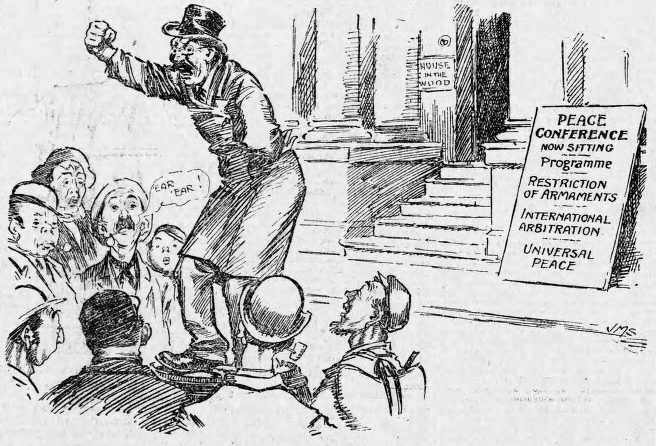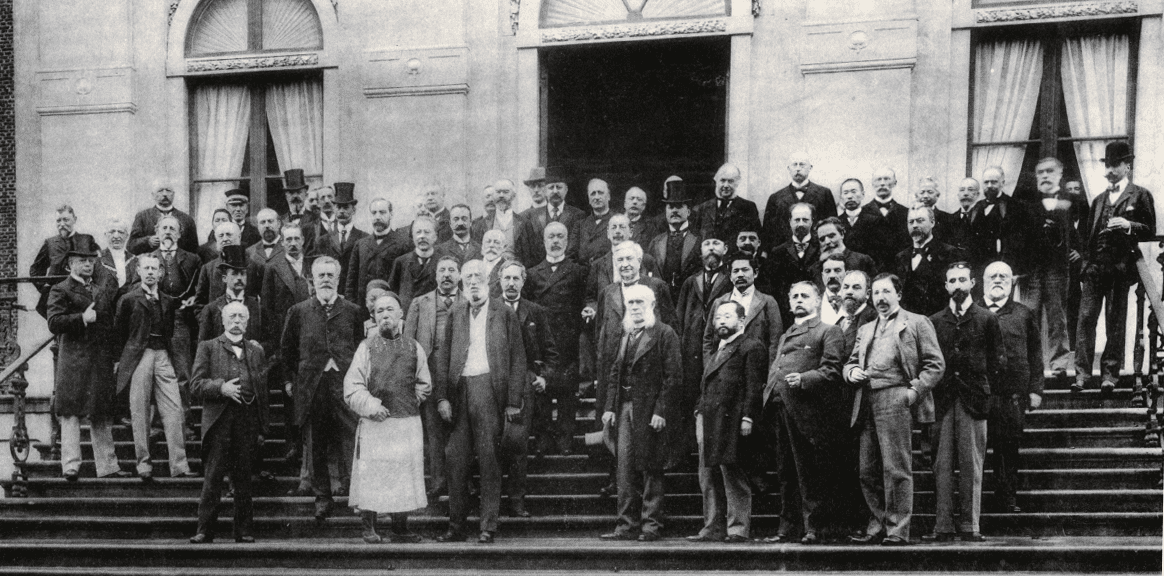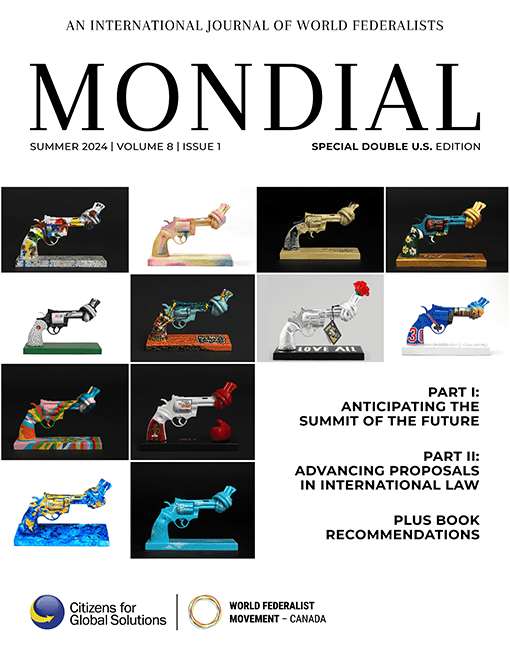Mondial Article (Summer 2024)
Trials, Tribunals, & Tribulations:
Reflections on the 125th Anniversary of the First Hague Peace Conference
This article kicks off a special section in this issue of Mondial, exploring proposals to advance international law, such as a Crimes Against Humanity Treaty, an International Anti-Corruption Court, and UNSC veto reform. We start by examining the origins of modern international legal structures and ways to strengthen them.

Alyn Ware
Alyn Ware is the Program Director for World Federalist Movement – Institute for Global Policy, Global Coordinator for Parliamentarians for Nuclear Nonproliferation and Disarmament, Peace and Disarmament Program Director for the World Future Council, and Director of Basel Peace Office. Alyn also acts as the Global Contributing Editor of Mondial.
Rebecca A. Shoot
Rebecca A. Shoot is the Editor-in-Chief of Mondial and Executive Director of Citizens for Global Solutions. She is the Co-Convener of the Washington Working Group for the International Criminal Court and Co-Founder and Convener of ImPACT Coalitions on Just Institutions and the International Court of Justice, and International Anti-Corruption Court.
Neshan Gunasekera
Neshan Gunasekera is a Lawyer and Educator. He is a Visiting Fellow at the Raoul Wallenberg Institute and Lead Counsel for Peace, Justice, and Governance at the Centre for International Sustainable Development Law. He is a member of the World Future Council and recipient of Weeramantry International Justice Award.
One-hundred and twenty-five years ago, the 1899 Hague Peace Conference gave the world the first formal statement of the laws of war and war crimes, in the modern sense. This singular event led to the corpus of secular international law and established the first international tribunal, the Permanent Court of Arbitration (PCA). The ambitious multilateral effort attempted what had heretofore been unimaginable: it began to impose order to the most devastating and anarchic human phenomenon, war. Above all, it aimed to achieve peace through justice and the rule of law. As a leading scholar has observed: “The Hague Convention was the first stepping-stone along that winding road that would bring the nations to ICC Headquarters a full century later.” (Eyffinger, Friedrich Martens: A Founding Father of the Hague Tradition, 2012, 25) This gave birth to a century of international law that would include the promulgation of hundreds of multilateral treaties (more than 600 registered with the UN) and the establishment of a number of additional courts and tribunals to help ensure compliance with these legal instruments.
And yet, the twentieth century would go on to be the bloodiest in recorded history and the twenty-first has brought further internationalization of armed conflicts and proliferation in their number. For some, this unchecked violence is evidence that international law does not exist, or that if it does, the lack of implementation or enforcement mechanisms render it easily flouted and obsolete. However, we should not dismiss law and multilateralism too hastily.
To paraphrase a quotation often attributed to Mark Twain upon reading his own fallacious obituary, reports of the death of international law have been greatly exaggerated. In fact, as diplomacy falters or fails, violence escalates, and legal safeguards are violated in many situations, governments are turning more frequently to international courts and tribunals to address a wide variety of disputes and critical issues. And international courts, although straining from their increased caseloads and high expectations, are responding by generally delivering – with some exceptions – sound and detailed decisions that have considerable and positive influence in dispute resolution and accountability for atrocities.
A direct lineage can be traced back from the unprecedented gathering in The Hague to current efforts to support the rule of law globally. As a member of the American delegation to the conference, Andrew Dickson White, said of its aspirations: “If the world is ever to have any soul, if it is ever to rise out of materialism, it will be by work such as this.” Today that work must and does continue.
The Significance of the 1899 Conference
Having commenced on May 18, the birthday of Czar Nicholas II, the Hague conference culminated on July 29, 1899, in the Paleis Huis ten Bosch with the signing of an array of treaties, declarations, and commitments that would form the bedrock of international humanitarian law – the law of war. Conference President Baron de Staal, head of the Russian delegation, enjoined colleagues that the undertaking “strive to attain the grand and noble object set before it … namely, the maintenance of general peace and the reduction of excessive armaments.” Notable conference outcomes included the Convention respecting the Laws and Customs of War on Land; the Convention for the Adaptation to Maritime Warfare of the Principles of the Geneva Convention; various declarations prohibiting certain forms of warfare, such as the use of asphyxiating gasses and expanding bullets; and the Convention for the Pacific Settlement of International Disputes, which led to the creation of the PCA.
Delegates at the first Hague Conference comprised a group of men representing 26 predominantly European countries, along with the United States and Mexico. Although she was barred from formally attending, Bertha von Suttner, a leader of the International Arbitration and Peace Association and the first woman to be honored with the Nobel Peace Prize, participated actively in the conference preparations and side activity, including organizing a petition of eminent persons and hosting a salon across the street from the venue. In her diary of the conference, she reflected: “Gospels need to be distributed, preached and explained a long time until they get into the conscience of the people.”
The delegates of the First Peace Conference (1899) pose on the steps of “Huis ten Bosch” Palace in The Hague. Credit via Wikimedia Commons.
When the Second Peace Conference was convened in 1907, she would be the only woman in attendance and used her interventions to criticize what she perceived as a pedantic focus on legal arcana and myopic failure to confront the threat of imminent hostilities in Europe. She presciently used her Nobel address to warn of the specter of war on the horizon. This dialectic between the peace and law communities continues today.
The 1899 Hague Peace Conference signaled the beginning of a transition from international relations governed by the Law of Force toward a system governed by the Rule (Force) of Law. The two centuries leading up to this historic negotiation were riddled by hundreds of armed conflicts that were a normal course of political action, according to General Carl von Clausewitz, a Prussian general and military theorist who exemplified the spirit of his time. War was not considered a failure of politics, but “a real political instrument, a continuation of political intercourse, a carrying out of the same by other means.”
The diplomats convening in The Hague had a different opinion of relations between States. The Brazilian delegate, Ruy Barbosa, observed: “Justice is the foundation of society, and its cornerstone is the resolution of disputes through reason and law, not through force” Friedrich Martens, Russian diplomat and legal scholar struck a galvanizing chord: “War is an ordeal by fire, and it is the duty of civilized nations to mitigate as far as possible its horrors.”
Martens was hailed in his time and his reputation lives on as the “Soul of the Hague Peace Conference.” (Eyffinger 2012, 13) This renown derived chiefly from his advocacy to increase the practice of international arbitration, “his crusade for humanitarian concepts, epitomized in the famous ‘Martens Clause,’ and his pivotal role in creating … ‘The Hague Tradition.’” (Id) At the founding of the League of Nations, Martens urged that the PCA’s jurisdiction be compulsory – a project that continues today with the International Court of Justice (ICJ).
Until a more complete code of the laws of war has been issued, the High Contracting Parties deem it expedient to declare that, in cases not included in the Regulations adopted by them, the inhabitants and the belligerents remain under the protection and the rule of the principles of the law of nations, as they result from the usages established among civilized peoples, from the laws of humanity, and the dictates of public conscience.
Martens Clause, 1899 Hague Conventions
Although it would subsequently be enshrined in the 1949 Geneva Conventions and 1977 Additional Protocols, the Martens Clause has been considered an “elusive gem of diplomacy.” Seen by some as a vague and empty promise or “diplomatic gimmick,” for others it represented a “historic juncture in the history of the discipline” of international law with a “veritable norm-creating character.” (Id, 25). In fact, Eyffinger argues, the clause was far from a gimmick “and only to a very limited extent a compromise … [that] filled a vacuum between international humanitarian law and the arbitrariness of ‘victor’s law.’” (Id). The Clause has been utilized and noted in a number of ICJ cases, including the 1996 Advisory Opinion on the Legality of the Threat or Use of Nuclear Weapons, during which civil society organizations delivered over six million ‘Declarations of Public Conscience’ to the Court based on the Martens Clause. The court took note and made a number of references to the Marten’s Clause in its judgment, including “Finally, the Court points to the Martens Clause, whose continuing existence and applicability is not to be doubted, as an affirmation that the principles and rules of humanitarian law apply to nuclear weapons.” (ICJ Advisory Opinion July 8, 1996. Paragraph 87)

Political Cartoon by JM Staniforth. As the first Hague Convention on peace convenes, a crowd listens to an Imperialist agitator who spreads words of aggression and argues that Britain should arm herself more. Credit: Public common, Library of Congress.
Carrying Forward the Legacy of 1899
Today, the PCA has its own seat in The Peace Palace, down the road from the royal residence that housed the 1899 conference. It is joined there by the ICJ. The latter, building upon the jurisprudence and learning from the Permanent Court of International Justice (PCIJ, 1922), was founded nearly a half century later as the principal organ of the UN and as the expression of the UN Charter’s aspiration of a standing judicial mechanism recognized by all States as a legitimate means for the pacific resolution of disputes. It has never been busier. It is also profoundly misunderstood by many, as is the International Criminal Court (ICC), which became operational in 2002 with a mission to end impunity for individual perpetrators of the gravest crimes.
The ICJ has proven to be one of the most effective organs of the UN. Since its establishment in 1945, the Court has considered 195 cases. Today, it is seized of an unprecedented number (25) and diverse array, including treaty-based questions of genocide and atrocities, territorial and border disagreements, and requests for advisory opinions on such novel issues as the obligations of States with respect to climate change. According to leading judges on the Court, such as former ICJ President Joan Donoghue (2010-2024, USA) and former ICJ Vice President C.G. Weeramantry (1990-1999, Sri Lanka), an overwhelming majority of its decisions have been accepted by all parties and implemented.
It is noteworthy that many of the successful cases have involved small countries winning in the court against much more powerful States. This generally has been followed by unsuccessful parties acceding to and implementing the Court’s decision. Examples of adherence include territorial disputes, such as with Chad v Libya (1994), where the ICJ settled a longstanding and often bloody dispute between the two countries over ownership of the resource-rich Aouzou Strip on their contested border. The Court ruled in Chad’s favor. Libya accepted the decision, withdrew its forces and signed a peace agreement with Chad that still holds today.
Even when the losing party has initially rejected the Court’s decision, as with Nicaragua v. US (1986), where the United States abjured a judgment finding its financing of Contras was an illegal violation of state sovereignty, the ICJ decision has been a powerful tool for domestic advocacy and legal recourse. In that instance, elevated public attention, coupled with strategic advocacy and litigation by citizens from the World Federalist Movement, can be traced to a policy about face. Even refusal to participate has not been an insurmountable barrier to major reform, as with New Zealand v. France (1974), where the Court addressed the French nuclear testing program in the Pacific. Although France did not take part in the proceedings, the decision led to the end of its atmospheric testing program and permanent closure of test sites the following year.
The Next Evolutionary Phase?
International law can – indeed must – evolve for the 21st century beyond the state-centric 19th and 20th centuries to requirements of an evolving world order, including transnational, environmental considerations. And there are signs that evolutionary leaps are indeed taking place (See C.G. Weeramantry, Universalizing International Law, Marinus Nijhoff Publishers 2004).
Moreover, one need not be a singular figure like Bertha von Suttner or Friedrich Martens to advance international law. For example, grassroots activism and pressure on States by non-governmental actors like the Commission of Small Island States on Climate Change in International Law and young leaders from Pacific Island States led to a unanimous UNGA Resolution requesting that the ICJ deliver an Advisory Opinion on the Obligations of States with Respect to Climate Change, of which the Court is seized as of this article’s writing. The International Tribunal on the Law of the Sea, a little discussed but immensely powerful tool that sits in Hamburg, Germany, recently reached its unanimous conclusions on similar responsibility in a maritime setting, finding that “States Parties to the [UN Convention on the Law of the Sea (UNCLOS)] have specific obligations under article 194 of UNCLOS to take all necessary measures to prevent, reduce, and control marine pollution.” The ICC commissioned an expert review to define the crime of ecocide and help determine whether it should be an independent crime under the Rome Statute. The ICC’s current Prosecutor also has committed to fully utilizing existing provisions for environmental crimes as the basis for prosecution, including launching a public consultation.
Although these are positive examples of growth in the international global justice system, much work remains. Despite the World Court’s prolific output and extensive mandate, the ICJ faces numerous challenges in realizing its full potential effectiveness. First among these are the limitations on its jurisdiction. In recent years, some States have galvanized to promote the universality of the ICJ. However, these efforts have not cohered strategically with the support of a multi-stakeholder coalition. That is changing with the establishment of Legal Alternatives to War (LAW not War), a global civil society-led campaign to increase the Court’s ability to effectively fulfill its mandate as the world’s principal judicial organ for peacefully resolving conflicts between states, ensuring justice and upholding the rule of law.
Conclusion
Where international courts and tribunals have been characterized as bugaboos to be mistrusted – or worse, sanctioned – it is imperative to understand their role with the broader evolution of international law. International law does not function in hermetic isolation but is a part of society. Accordingly, it should reflect society’s evolution.
Like all human-made institutions, international courts and tribunals are imperfect. This is why it is critical that they have the capacity to realize their indispensable mandates and that they adapt to contemporary realities. Without full support for these bodies, humanity risks regression into a Hobbesian state. In 1899, the official Russian declaration statement held that “the final object of international law is to regulate the mutual relations of States, not only by preventing conflicts which may arise between them, but by organizing justice in such a manner as to render these conflicts impossible.”
Having moved at the Hague Peace Conference from the prevailing 19th century wisdom of “might makes right” advanced by General von Clausewitz and his ilk to the state-centric approach of the 20th century, another key change is imperative to meet 21st century requirements of an evolving world order.
Mondial is published by the Citizens for Global Solutions (CGS) and World Federalist Movement — Canada (WFM-Canada), non-profit, non-partisan, and non-governmental Member Organizations of the World Federalist Movement-Institute for Government Policy (WFM-IGP). Mondial seeks to provide a forum for diverse voices and opinions on topics related to democratic world federation. The views expressed by contributing authors herein do not necessarily reflect the organizational positions of CGS or WFM-Canada, or those of the Masthead membership.

































